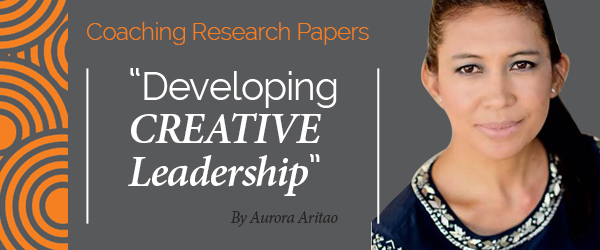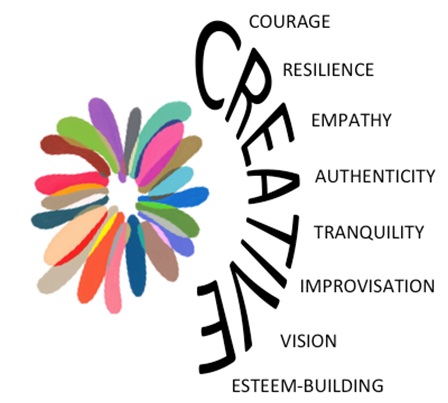 Research Paper By Aurora Aritao
Research Paper By Aurora Aritao
(Executive Leadership Coach, HONG KONG)
Introduction
To be an impactful leader, role model and influencer in today’s increasingly complex and unpredictable environment, it is simply not enough to be excellent at the requisite technical and business skills. Most of the old management methodologies – the linear, logical, systematic way that has worked in the past are obsolete in terms of meeting the challenges of innovating businesses today.
There is an enigma in organizations today – despite all the technological advancement, training and motivational initiatives, we keep hearing from management surveys that productivity and internal engagement are still disappointing to many firms.
Andrew O’Keefe in his book Hardwired Humans, states that most leaders find the toughest part of their job – the one more likely to keep them awake at night – is the ‘people’ dimension. Moreover, an ICF blog posted by R. Williams PCC states that in the past 20 years, 30% of Fortune 500 chief executives have lasted less than 3 years. “I am convinced that the focus on leadership development is in the wrong place. Most initiatives focus on competencies, skill development and techniques, which in some ways is like re-arranging the deck chairs on a sinking ship. Good leaders need to become masters of themselves before they can be masters of anything else,” Williams said.
This paper summarizes my investigations using various sources in books, articles, blogs and talks from opinion makers and experts. This paper presents a set of aptitudes, contextual-thinking soft skills or ‘right-brain’ aptitudes, identified to be what leaders need to develop and nurture – complementary to their expertise, capability and experience – to be truly effective and have lasting impact as a leader.
Creative Leadership Aptitudes
A leader requires significant skill as a contextual thinker. Contextual thinking involves distinct skill sets like sensitivity to people and environment (i.e. social intelligence) and interpersonal skills (i.e. emotional intelligence). An otherwise strong leader with weak contextual skills will find that their grand visions and plans will often shipwreck on the hard rocks of context each and every time. This is often why some particularly visionary leaders fail – too much vision and too little contextual understanding and sub-par implementation. (Turner, 2012)
These 8 aptitudes interplayed with competence, knowledge and experience are believed to greatly enhance a leader’s performance and efficacy, and support them in attaining sustainable professional success and personal fulfillment.
 Courage – Mastery of Fear
Courage – Mastery of Fear
Courage is resistance to fear, mastery of fear, not absence of fear Mark Twain
Courage is having the ability to overcome fears and continue to accomplish endeavors in spite of these fears. Our fears may never completely go away, but we can influence how we relate to our fears. When we are challenged to step up, some of us rise to the occasion, but many of us suffer from fear of failure, fear of ridicule, fear of letting others down.
Most people ignore or conceal fears as a coping strategy, but this does not help in the long run. Having courage is facing these fears head on, accepting them in the service of something good. Courageous people take a stand not because they think they are always right but because they are not afraid to be wrong.
For top leaders, one of the key questions to ask, according to Rosalinde Torres in her TED talk in San Francisco is: are you courageous enough to abandon a practice that has made you successful in the past? Torres shares that great leaders dare to be different. They don’t just talk about risk-taking, they actually do it.
And one of the leaders shared with me the fact that the most impactful development comes when you are able to build the emotional stamina to withstand people telling you that your new idea is naïve or reckless or just plain stupid. Now interestingly, the people who will join you are not your usual suspects in your network. They’re often people that think differently and therefore are willing to join you in taking a courageous leap. And it’s a leap, not a step. (Torres, 2013). Her talk is here.
Resilience – Grit
Our greatest glory is not in never failing, but in rising every time we fall. Confucius
Resilience is the ability to withstand or recover quickly from difficult conditions. It is our ability to bounce back from adversity. According to Martin Seligman in his book Flourish, resilience or GRIT is an extreme trait of self-discipline. It is a combination of very high persistence and high passion for an objective.
Change, set backs and challenges are inevitable – the best thing to do is not to complain, blame or give up, but to suck it up, get back up and get on with it. People strong in resilience take hardships and setbacks in their stride.
Angela Lee Duckworth in her TED talk back in May 2013 on “The Key to Success?” shares the results of various research conducted to study success. In all the very different contexts covered, from the military to spelling bees in the U.S. and business organizations: “…one characteristic emerged as a significant predictor of success. And it wasn’t social intelligence. It wasn’t good looks, physical health, and it wasn’t I.Q. It was grit. Grit is passion and perseverance for very long-term goals. “ Here TED talk is here.
Empathy – Seeing with ‘their’ Eyes
When I get ready to talk to people, I spend two thirds of the time thinking what they want to hear and one third thinking about what I want to say. Abraham Lincoln
People strong in Empathy
feel connected to others though their ability to sense and understand what other people are feeling. They have a natural connection with other people… and can feel what they are feeling., (Linley, Willers & Biswas-Diener, 2010, p.128)
Daniel H. Pink defines Empathy, as the ability… to see with ‘their’ eyes and to feel with ‘their’ hearts. It is something we do pretty much spontaneously, an act of instinct rather than the product of deliberation…”The capacity for the logical thought is one of the things that makes us human. But in a world of ubiquitous information and advanced analytical tools, logic alone won’t do. What will distinguish those who thrive will be their ability to understand what makes their fellow woman or man stick, to forge relationships, and to care for others.” (Pink, 2006, p.66)
Empathy in the workplace is linked to the ability to take multiple perspectives. To this end it is important for people to truly understand what others do in the organization. What is their real work, beyond the job descriptions, beyond the surface? What is their motivation, what is at stake for them? Perspective-taking capacity is a critical meta-skill for leadership. It is the “ability to understand, critically consider & integrate multiple competing perspectives to guide action (Spence & Cavanagh, 2006).
Authenticity – Being True to Self
The privilege of a lifetime is to become who you truly are. C.G. Jung
One of the issues that sometimes surfaces about leaders is their lack of personal integrity. Leading can often mean having to deal with company politics and in this murky place we get challenged in ways that involve compromising our beliefs, principles and values. The occasional incidents of having to make such compromises is part of work life, but if one is systematically exposed to lying, backstabbing, favoritism/nepotism and cheating he may find himself down a slippery slope to stress and lower satisfaction at work.
People strong in authenticity are always true to themselves, even in the face of pressure from others. If one is high in Authenticity, whatever he does, he does it with genuine feeling and without pretense. He always keeps to his own values and beliefs, no matter what people want him to do. Indeed regardless of pressure from others, he is proud to stand up for what he believes in,… He is likely to place a high premium on honesty. (Liney, Willers & Biswas-Diener, 2010, p.96)